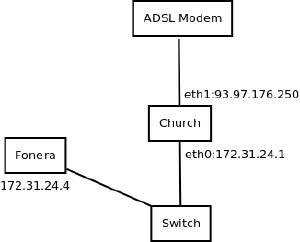Laboratory 24/Network
Lab24 has a number of network points, wired across the false ceiling. These terminate in the dirty room cabinet.
See also Infrastructure and System_naming and Member_accounts.
Addressing
The space's dns zone is lan.london.hackspace.org.uk. Our IP range (assigned in ChaosVPN) is 172.31.24.0/23.
Internet Routing
Our internet is the Be Pro service:
IP: 93.97.176.250 Netmask: 255.255.248.0 Gateway: 93.97.176.1 DNS 1: 87.194.255.154 DNS 2: 87.194.255.155
We use a Draytek Vigor 120 modem which simply bridges the ADSL to ethernet. You can access this at http://192.168.2.1 (no username/password).
Routing is handled by Church, and the wireless is currently handled by the Fonera.
IPv6
We also advertise and route IPv6 within the space. This is currently tunnelled to Hurricane Electric. The account is currently with Mark, but will be transferred shortly.
IP prefix: 2001:470:92f1::/48
We do not use DHCP for IPv6 at the moment, so do not provide automatic rDNS. Servers are set up for DNS under hack.rs, which is also currently with Mark.
Switches
3com (always on), in the space dns zone as 'switch'. The switch is a 3CR17501-91, and is at 172.31.24.2. Please don't play.
Servers
- Babbage monitoring, IRC, storage, general purpose server (always on)
- Gutenberg (HP LaserJet 1022), shared via cups (ipp)
- Webcams
3G dongle- Apache for http://hack.rs
- Bell The door/building management controller (always on)
Flowers The door/building management controller (always on)
Workstations
- Lovelace Makerbot
Flowers Media PC (currently unused)- Laz0rs laser cutter (hackspaceremote/hackspace maps to password-less user hackspace)
- Postel The SGI O2
- Difference Desktop PC
- Touch table PC
Outside Lab24: Turing Bitfolk VM
Working on the network
All members have access to the servers, and with that, the ability to make changes. It's crucial to remember that this is a shared network and any changes you make will affect others. In particular, please don't install updates or restart machines without a good reason and checking on IRC first.
Each piece of hardware will have its own logbook page on the wiki, where you should log significant changes and problems.
Some servers, such as Babbage, run services written for the space, typically running in a screen session. The code for these can be found on Github.
